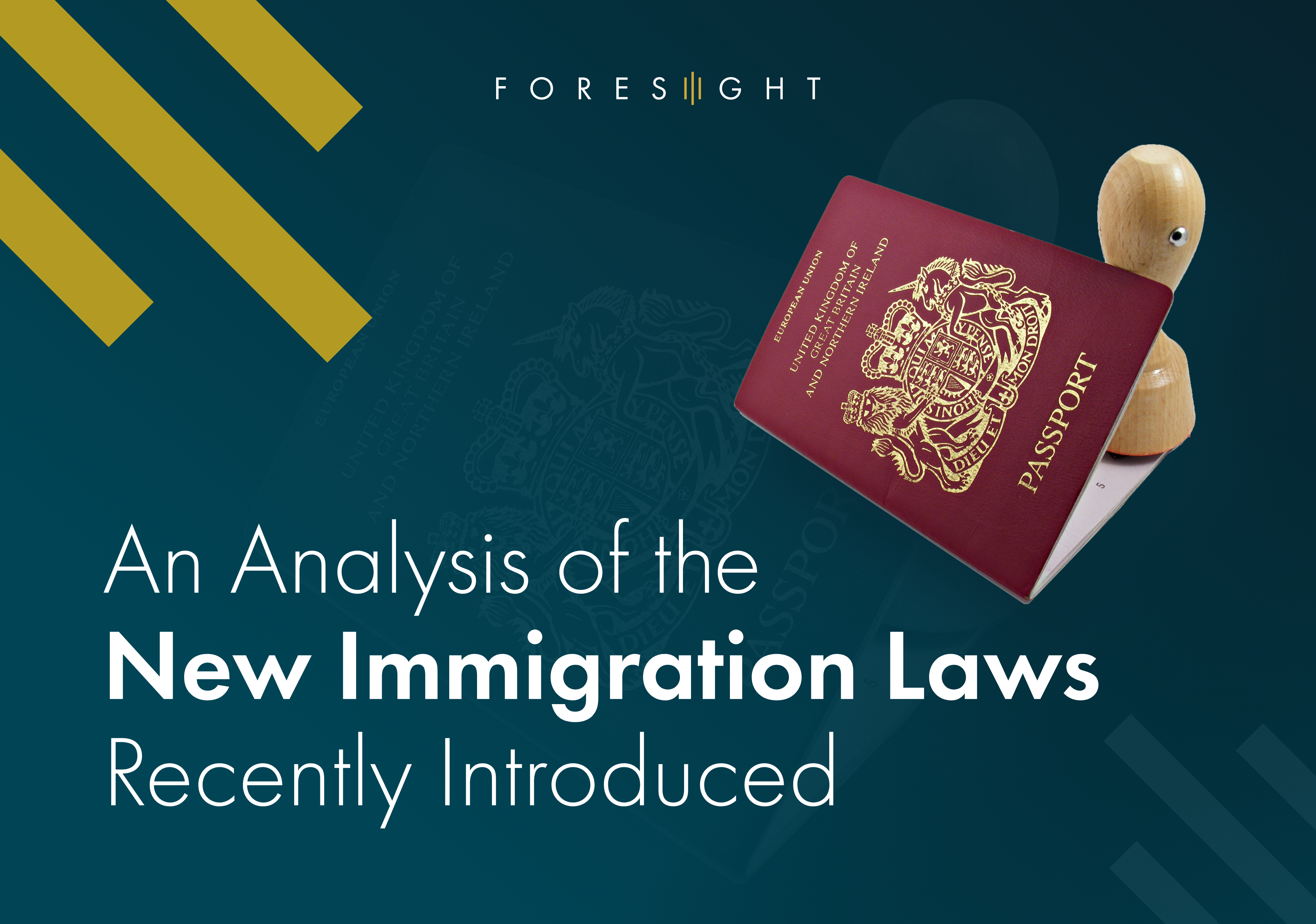News

Jun 11, 2024 by Foresight
An Analysis of the New Immigration Laws Recently Introduced
Recent changes have brought significant challenges and opportunities for both individuals and legal practitioners in the intricate world of immigration law, where on December 4th 2023, Home Secretary James Cleverly introduced a "5-point plan" aimed at reducing immigration, a move that has far-reaching implications.
The Home Office have since elaborated on these changes on December 21st 2023, and they officially came into force following 2 sets of revisions to the Immigration Rules on February 19 and March 14, 2024.
Here, we examine these changes, their impacts and the context driving them, beginning with:
The 5 key changes in the new immigration laws
- Restrictions on Social Care workers' dependants: Social Care workers are now prohibited from bringing their partners and children on their visas. This change took effect on March 11th 2024, and is a policy shift which aims to curb the number of new arrivals in this sector, something which has seen substantial growth in recent years.
- Increased minimum salary for skilled worker visas: The baseline minimum salary required for a skilled worker visa has increased from £26,200 to £38,700, and the “going rate” specific to each job has also increased significantly too. These adjustments came into force on April 4th 2024 and is a move designed to ensure that only high-paid and high-skilled workers qualify for these visas, aligning with the government's broader economic objectives.
- Introduction of the immigration salary list: a newly created immigration salary list now replaces the shortage occupation list, reducing the number of jobs eligible for a skilled worker visa at a lower salary threshold. This interim list also took effect on April 4th 2024, though further reviews are expected later in the year. Now however, this newly streamlined list aims to focus on occupations that truly require international talent due to local shortages.
- Higher minimum income for sponsoring spouse or partner visas: the minimum income required to sponsor a spouse or partner visa has increased from £18,600 to £29,000, effective April 11th 2024, and whilst there are plans to further increase this threshold to approximately £34,500 later in 2024 and to around £38,700 by early 2025, this increase reflects the government's commitment to ensuring that sponsors can support their dependants without relying on public funds.
- Review of the graduate visa: the graduate visa is a 2-year unsponsored work permit for overseas graduates of British universities, and is currently under review with a report expected by May 14th 2024. This review will assess the visa's impact on the labour market and immigration levels, potentially leading to significant changes in how international graduates can remain and work in the UK.
The rationale behind the changes
The government argues that these changes are necessary to address high levels of immigration, particularly as net migration in 2022 was estimated at 745,000, with significant contributions from international students, social care workers, their dependants, humanitarian visa schemes and asylum seekers.
Reflecting on this, the Home Office suggests that if these changes had been in place earlier, approximately 300,000 fewer people would have moved to the UK last year. Hence, the new changes.
Implementation timeline
Important dates to be aware of for the new immigration laws are:
- March 11th 2024: where the ban on newly arriving Social Care workers bringing dependants came into force.
- April 4th 2024: the implementation of the increased minimum salary for skilled worker visas and the introduction of the immigration salary list.
- April 11th 2024: where the increased minimum income requirement for spouse or partner visas began.
- May 14th 2024: the review of the Graduate visa has begun also.
Parliamentary approval and debates
The visa regulation changes are enacted through statements of changes to the Immigration Rules, which are taken into effect automatically, unless annulled by a vote in either the House of Commons or House of Lords within 40 days.
This process means that MPs are unlikely to vote directly on these changes, however, discussions like the Westminster Hall debate on the family visa changes scheduled for April 23rd 2024, provide a platform for dialogue without resulting in a formal vote.
In conclusion, the recent changes to the UK immigration laws represent a significant shift towards more restrictive policies, particularly affecting social care workers, skilled workers and family reunification applicants, and whilst the government aims to reduce net migration and ensure economic self-sufficiency among new arrivals, these changes may have far-reaching consequences for the UK’s labour market and its attractiveness as a destination for skilled professionals and international students.
But by understanding these new regulations and their implications, individuals and businesses can better navigate the evolving immigration landscape and make informed decisions, and we’re proud to say that Foresight are here to help.
About us
Foresight brings the UK’s most comprehensive panel of expert witnesses to support immigration, family and criminal law cases. As an industry-leading provider, we help legal professionals save time and work smarter by sourcing the most suitably qualified and highly experienced expert to support their case within LAA rates, if required - no matter the discipline, no matter the deadline.
If you would like to talk to our team or to find out more about our services, reach out today.
FIND YOUR
EXPERT WITNESS
CALL OUR TEAM ON
0330 088 9000
NEWSLETTER SIGN-UP
Stay up-to-date with all the latest news in the industry by signing up to our newsletter. You're welcome to unsubscribe at any time and we'll always treat your personal details with the utmost care.

